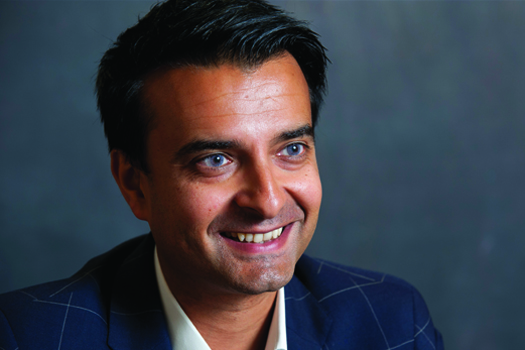The model of general practice and traditional face-to-face consultations may be on borrowed time, and this is in no small part due to Dr Mobasher Butt and Babylon, where he is medical director.
The arrival of a pro-technology health secretary in Matt Hancock has increased the power of Dr Butt. Mr Hancock is a patient of GP at Hand – the online NHS service powered by Babylon – and he has reportedly described it as ‘brilliant’.
Even RCGP chair Professor Helen Stokes-Lampard has said GPs ‘have a lot to learn’ from Babylon.
Patients who use the service register with an NHS practice – Dr Jefferies and Partners in west London – and can then access free video consultations through the GP at Hand app, usually within two hours.
Dr Butt says GP at Hand is ‘definitely the first of its kind in the whole of NHS’s 70-year history’, and described its launch as a ‘landmark’ moment.
Yet some GP leaders are concerned about the way GP at Hand targets younger, fitter patients. Professor Stokes-Lampard has described it as ‘disruptive innovation at its most disruptive’, while the BMA considered legal action against the service.
It has already led to a proposed change to the GP contract to ensure funding is shared more fairly between ‘digital first’ practices and those providing traditional services. That is the power of Babylon.
For Dr Butt, another important milestone was reached this year when Babylon claimed the artificial intelligence behind its app, which checks patients’ symptoms and offers medical and triage advice, was ‘on a par’ with doctors, following testing that used trainee GP exams. ‘It was a really proud moment being able to show that… now the technology has caught up,’ he says.
But that claim was dismissed by the profession. The RCGP said it was ‘dubious’ an algorithm could match the performance of an average candidate in its trainee exams.
Dr Butt says GP at Hand wants to expand across England – and that there is interest in the devolved nations. He says his team is in discussions ‘with tens of practices’ about setting up partnerships.
He may be determining the future of the profession, for better or for worse.
Babylon’s chief medical officer on…
Increasing competition between NHS practices: ‘You’ve already got large groups, federations, who might be competing with singlehanded GP practices. It’s an even playing field… there’s nothing about the launch of GP at Hand that precludes anyone else from forming similar innovative solutions for their patients’
Cherry-picking patients: ‘The allegations of cherry-picking are simply not true. NHS England at the start of GP at Hand said it would be advisable that certain patient groups made sure they understood the service before signing up. These categorically are not exclusion groups and it’s very clear on our website’
Accusations of taking funding from other NHS practices: ‘If we have problems with the funding formula then we should all work collectively to think about how to fix it – not start saying let’s try to thwart innovation’
Continuity of care: ‘The idea that people have one GP from childhood through to adult life is sadly something that just isn’t true anymore. What’s important is that for certain episodes of illness you have continuity of care, so if you develop depression someone looks after you from the first consultation through to you being stable. Through our service you can book in to see the same GP or therapist’
Expansion plans: ‘We would like to definitely roll GP at Hand out to other cities across the UK. We are talking to tens of practices [about partnership]’
‘Digital-first’ GP services: ‘About 85% of cases can be dealt with entirely via virtual consultation’
Digital-first services as a solution to the recruitment crisis: ‘You can potentially deliver care from a different location but then have a smaller number of GPs who are in that population to actually do the physical care that’s needed – that really helps make sure surgeries don’t close in areas that really need them but where people are struggling to get GPs into jobs’
Pulse October survey
Take our July 2025 survey to potentially win £1.000 worth of tokens















